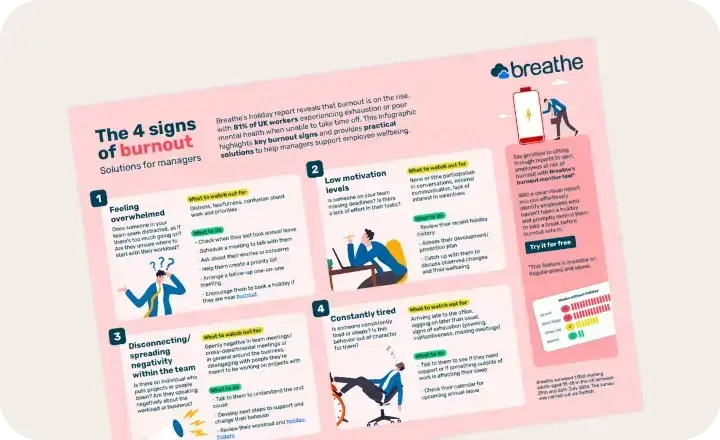Our latest research shows how burnout is becoming a team-wide issue. That’s why we launched “Burnout Deadline Day,” a campaign to raise awareness - and offer solutions.
We revealed that millions of UK workers are “holiday hoarders”, and it could be making them sick. This research focused on those whose holiday year runs from January to December.
This is having an impact on employee wellbeing. The data shows that workers who holiday hoard are at risk of sickness and burnout. Of the “holiday hoarders” taking less than half their holiday by 2nd July, the survey found:
There are currently over 34 million people employed in the UK. This means an estimated 22.5 million workers are typically taking less than half their holiday by 2nd July, and around 10 million workers are at risk of burnout by autumn, according to Breathe HR’s findings.
There is a solution. The research suggests that when workers spread leave evenly across the year, they are happier, healthier, and more productive. When workers were asked about the impact of taking regular breaks from work:
-
Nearly 4 in 5 (79%) said they feel happier when they spread their leave
-
Nearly 3 in 4 (73%) said they feel more productive when they spread their leave
-
Nearly three-quarters (72%) feel less run down and/or burnt out when they take regular breaks throughout the year
Despite the clear benefits, workloads and attitudes towards taking time off are among the factors preventing staff from taking regular breaks:
-
1 in 5 (21%) workers aren’t encouraged by their employer or manager to take a holiday
-
Nearly 1 in 3 (29%) feel their workload prevents them from taking holiday
-
More than 1 in 4 (28%) find it difficult to find out how much holiday they have used and have left
A separate 2024 Breathe HR report found that 42% of workers who didn’t use their full annual holiday allowance said staff shortages made it difficult to take time off.
2nd July: Burnout Deadline Day
To raise awareness of the holiday hoarding crisis and its impact, Breathe HR is calling on employers to recognise 2nd July as “Burnout Deadline Day”: the halfway point in the year by which workers should have taken around half of their holiday to prevent burnout.
The company is calling on employers to encourage staff to spread breaks evenly throughout the year, and build cultures where staff are encouraged to take the time off that they are entitled to.
To help employers battle burnout and holiday hoarding, Breathe HR is making free resources available to businesses through their Burnout Hub. Tools to help track and monitor holiday and burnout are also available through Breathe HR.
“We’re in a burnout epidemic. To protect our people and business performance, wellbeing cannot be an afterthought; it must be built into the core of how companies operate. Encouraging staff to take regular holidays is a huge part of this.
“I don’t just mean a once in a blue moon reminder to take a break. Words must be backed up by action. Time off has to be genuinely feasible for staff and actively encouraged throughout the year. That means leaders must keep workloads manageable, regularly remind teams to take breaks, role-model the behaviour themselves, and ensure that finding policy information and booking leave is easy.
“Despite what hustle culture would have us believe, we’re not machines. No one can think strategically, make great decisions, or innovate without proper time off to rest and recharge. That’s why we at Breathe HR are calling on employers to recognise Burnout Deadline Day this 2nd July to help end holiday hoarding, and ensure staff can leverage their leave evenly across the year and protect their mental health.”
Phil Coxon, Managing Director at Breathe HR
“Taking regular breaks from work is essential - it enables us to refresh, unwind and spend time on ourselves and our loved ones. We can return to work feeling reinvigorated and ready for action! Holiday hoarding may be related to anxiety, the idea that we might need that time off to deal with an emergency, or that we’ll be judged by colleagues and management if we book annual leave. But it can lead to burnout - and that’s no good for the individual or the Organisation".
Margaret Lewis, CEO at Sheffield Mind
The findings come as separate research reveals that 85% of UK workers have experienced symptoms of burnout or exhaustion due to work, with nearly half needing to take time off work due to their mental health.
Overall, the hidden cost of employee sickness on employers is more than £100 billion per year, with poor mental health costing UK employers £51 billion per year.
For all press inquiries, please contact Amy Mace amy@crestcomms.com
.webp?width=300&height=53&name=BURNOUT%20HUB%20TAG%20(2).webp)







.webp)





.webp?width=564&height=513&name=Group%2029%20(1).webp)